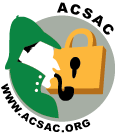Call for Tutorials
- When are tutorial proposals due?
- Tutorial proposals are due no later than start of business, Pacific time,
June 1June 9 (or June 16 if an extension is requested prior to the 9th). Instructors will be notified of Acceptance/Rejection by August 18. - What is a tutorial, and how does it differ from a paper or panel?
- An ACSAC tutorial is short course whose goal is to teach about some aspect of Computer Security. Tutorials are either full day (6 instruction hours) or half day (3 instruction hours). Note that instructors receive an honorarium to teach ACSAC tutorials ($1000 half-day, $2000 full-day). Instructors also have travel expenses covered.
An ACSAC tutorial is not:
- A report on your research.
- A general course on Computer Science.
- A attempt to market your product.
- What are good tutorial topics?
- Many topics are suitable for ACSAC tutorials. The best tutorials, however, relate either to technology areas or techniques. Extremely narrow topics, such as VMS security, are probably not appropriate for a broad conference such as ACSAC.
- What do I need to have ready for tutorial submission?
- Unlike papers, the tutorial does not need to be completely developed as of the time of submission. However, there must be a relatively firm outline of the tutorial, including preliminary allocations of how time is to be allocated to each section of the tutorial. A preliminary identification of a textbook is useful, but not required, at the time of submission. Tutorial proposals should make very clear the technical background expected. A tutorial on the security aspects of the X-technology should devote no more than 10% of the time to reviewing X-technology only insofar as necessary to establish a common basis for the discussion of security. You do not need to provide a general computer security overview.
- How do I structure a tutorial submission?
- Tutorial submissions are handled very differently than are papers or panel proposals. Most, if not all, tutorial submissions will be reformatted by the Tutorial Chair into a package that goes to tutorial reviewers. Your cooperation in structuring your tutorial submission properly is key.
Tutorial submissions should have the following structure:
- Title of the tutorial
- Indication of the desired length of the tutorial
- One to two paragraphs of introductory text about the tutorial.
- Identification of any prerequisites for the tutorial
- Identification of any textbooks for the tutorial
- One to two pages of outline for the tutorials. The main section level should provide rough time estimates.
- Identification of the author of the tutorial, including contact information (mailing address, email, fax)
- One to two paragraphs of biographical information about the instructor.
- How do I submit a tutorial proposal?
- Tutorials should be submitted electronically to the address tutorials@acsac.org. If for some reason this address does not work, submit them directly to faigin@aero.org.
Tutorials may be submitted in any of the following formats:
Preferred Formats
These formats are the easiest for the tutorial chair to cut and paste into the proposal document.Acceptable Formats
These formats usually require the tutorial chair to retype the submission into the proposal packageUnacceptable Formats
These formats cannot easily be printed, and thus cannot be manually entered into the package.Corel WordPerfect 8.0 or earlier HTML Raw LaTeX Microsoft Word 2003 or earlier Postscript Lotus WordPro/AmiPro Rich Text Format PDF Other WordProcessing Packages Text If you cannot submit a tutorial electronically, please mail it to:
Daniel Faigin ACSAC Tutorial Chair The Aerospace Corporation MS M1/055 P. O. Box 92957 Los Angeles CA 90009-2957
- What happens if my tutorial is accepted?
- If your tutorial is accepted, here's what you can expect.
- With the acceptance letter, you will receive a contract for the tutorial. This contract will detail how much you will get paid, and for what you will get reimbursed. You will need to return this contract to ACSA ASAP. You will need to have a US Taxpayer identification number.
- By mid-August, you will need to provide an updated version of the tutorial proposal for the Advance Program. For this, it is critical that the tutorial be described accurately, any prerequisites be noted, and the outline be correct.
- By 60 days before the conference, you will need to provide one hour's worth of material to the tutorial chair for review. At this time, you will also need to identify any textbook you will be using, or if you are providing papers instead, identify the relevant papers. Note that if you provide papers, you are responsible for obtaining copyright clearance.
- By 30 days before the conference, you will need to provide the entire tutorial to the tutorial chair. If papers are being provided, you'll need to provide copies of those papers.
- Who do I contact for more information?
- If you have any questions on the tutorial program or the tutorial submission process, please contact the Tutorial Chair.



